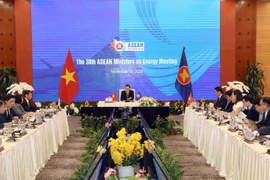Jakarta (VNA) – The Economic Research Institute for ASEAN and East Asia (ERIA) on April13 held a press conference to reveal outcomes of a study on hydrogen as an importantpart of carbon neutrality for ASEAN.
Members of ASEAN andthe East Asia Summit (EAS) need to bolster the use of renewable energy sourcesand work for energy sufficiency as well as clean energy transition ordecarbonisation, said ERIA Chief Operating Officer Hachiyama Koji.
The application of newenergy technologies such as carbon capture and storage (CCS) must be combinedwith that of clean technologies.
Of note, hydrogenshould be carefully considered because it does not emit CO2 and can be used infuel cell vehicles (FCVs) for transportation, for heat production in industry,and in power generation.
To support the furtherdevelopment of innovative technology and appropriate policies, ERIA initiatedthe EAS Hydrogen Working Group in 2019 as a platform for EAS countries tounderstand each other in terms of hydrogen demand, supply, and supply chainprogress in the region.
At the pressconference, a representative of the working group underlined the important roleof hydrogen towards carbon neutrality in the long term, and shared measures toturn hydrogen into a commercial energy source.
Support fromgovernments to increase hydrogen consumption, including exemption of importtariffs, is also necessary, heard the event.
Researchers proposedsetting a target of mixing hydrogen to natural gas at gas power plants startingfrom 5 percent by 2030, and bolstering discussions on hydrogen’s contributionto decarbonisation and cooperation framework so as to boost its use in EAScountries./.
Members of ASEAN andthe East Asia Summit (EAS) need to bolster the use of renewable energy sourcesand work for energy sufficiency as well as clean energy transition ordecarbonisation, said ERIA Chief Operating Officer Hachiyama Koji.
The application of newenergy technologies such as carbon capture and storage (CCS) must be combinedwith that of clean technologies.
Of note, hydrogenshould be carefully considered because it does not emit CO2 and can be used infuel cell vehicles (FCVs) for transportation, for heat production in industry,and in power generation.
To support the furtherdevelopment of innovative technology and appropriate policies, ERIA initiatedthe EAS Hydrogen Working Group in 2019 as a platform for EAS countries tounderstand each other in terms of hydrogen demand, supply, and supply chainprogress in the region.
At the pressconference, a representative of the working group underlined the important roleof hydrogen towards carbon neutrality in the long term, and shared measures toturn hydrogen into a commercial energy source.
Support fromgovernments to increase hydrogen consumption, including exemption of importtariffs, is also necessary, heard the event.
Researchers proposedsetting a target of mixing hydrogen to natural gas at gas power plants startingfrom 5 percent by 2030, and bolstering discussions on hydrogen’s contributionto decarbonisation and cooperation framework so as to boost its use in EAScountries./.
VNA




























